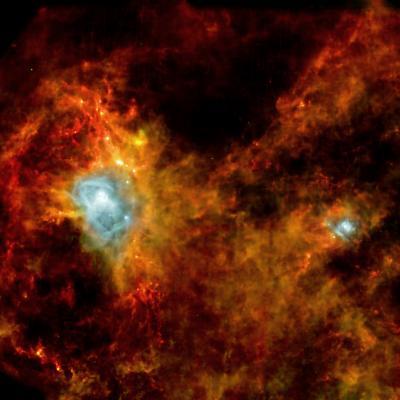The space telescope ended its journey as planned after four years of operation * The European Space Agency is considering launching it into deep space or crashing on the moon

The 18th century British astronomer William Herschel signed some of the most important discoveries in astronomy, including the discovery of infrared radiation and the planet Uranus. Herschel's memory has been immortalized in the European Union space telescope that bears his name, and yesterday he completed his mission. "Hershel" was launched 4 years ago. "His main tasks were observations in the far infrared range, that is, at very long wavelengths," explains Professor Hagai Netzer from Tel Aviv University. "These are observations of what is known in our language as 'cold regions', primarily places where new stars are formed all the time."
Accelerated birth of stars
Herschel was a very large telescope, 3.5 m, which allowed him to observe enormous distances of more than ten billion light years. "He discovered star formation at a tremendous rate that occurs in almost all regions of the distant universe," says Netzer. "They are formed at a rate 100 times faster than in very bright bodies, and 1000 times more than in our galaxy. Such observations help to explain, for example, the evolution processes of galaxies."
No helium for the moon
As mentioned, Herschel finished his journey as planned. Observations at his wavelengths require cooling his instruments to a temperature close to absolute zero, which necessitates the use of liquid helium, and now, when the helium runs out, it is no longer possible to operate the instruments. "Unfortunately, the next device will probably be built by Japan and European countries only at the end of the decade, or at the beginning of the next decade," says Prof. Netzer, who was a partner in the work with the telescope. "Herschel will not have a replacement in the coming years, but he did so many things that many scientists will continue to study the data he collected."
What will happen to the telescope now? The European Space Agency will be forced to divert it from orbit around the Earth, fearing that it will crash into our planet. Among other things, the possibility of launching it into deep space or causing it to crash - on the moon - is being examined.

7 תגובות
Why didn't we build a closed circuit cooling system?
It sounds silly that there is no possibility in a spacewalk to replace the tank with 4-year-old equipment
Nissim is a whole ladder a million kilometers long
Lorem Ipsum
Hubble is at an altitude of 560 km. Herschel is at 1,500,000. A simple refueling mission? 🙂
Herschel forgot to take the vitamin pill.
The Americans managed to do several surgeries to their space telescope including installing "glasses" to correct the distortion in the large mirror, replacing all the electronic systems several times, installing new cameras, replacing batteries and what not. The Europeans don't bother to send a simple refueling mission, which will double its lifespan (from four to eight years). Maybe they just can't?
How many discoveries could the telescope make in a few years of operation, how poor.
Why do we need liquid helium in space? Isn't the temperature there low enough anyway?
And what about the James Webb telescope, will it also be dependent on liquid helium?
It's strange that it couldn't be planned so that the helium reserves would be refilled, it seems to me that what ran out was the cash, not the helium...